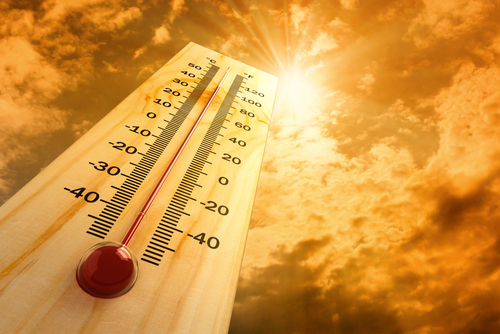It's Hot Outside!
Texas heat is nothing to mess with! If you’ve been around for a Texas summer or two, you know what being hot means on a whole different level than most Americans. I’m sure you’ve also noticed your electricity bill creep up as the seasons change for the warmer. Sometimes it’s hard to balance you and your family’s comfort-level and being energy efficient during the summer, but with some smarter choices, you can learn to control your electricity bill while surviving the heat this year! These tips can also help in the springtime, since we all know it can get pretty hot in April and May, too!!
The amount of heat we experience during the summer requires constant air conditioning, especially if your home isn’t as energy efficient as it could be. Don’t lose hope! Your home can still serve as an oasis in the summer heat without eating away at your finances.
1. Master Your Thermostat!
Keep your thermostat set as close to the outside ambient temperature as you can to minimize your air conditioning use. Also, keep any lights or appliances away from your thermostat to avoid an inaccurate temperature reading, which can cause your air conditioning to run longer than necessary. You can also program your thermostat to raise the temperature when you’re not at home or at night when outside temperatures are low. If you come home to a warm house, don’t turn the thermostat down all the way; you won’t cool your home down faster, and you’ll most likely waste energy by overcooling your home.
2. Use a Ceiling Fan!
A ceiling fan can make an air-conditioned room feel up to four degrees cooler. This cooling effect allows you to turn up your thermostat and save even more energy. However, cooling by convection only affects your perceived temperature and not the actual ambient air temperature in the room. In other words, you’ll feel cool when in the same room as the fan, but the overall temperature of your home will not change. So, remember to turn off your fans when you leave a room.
3. Keep Your Central Air Well Maintained!
During a long Texas summer, your central air system will run often. It’s important to maintain your system to keep it running as efficiently as possible. Any money you spend on maintenance may be offset by your energy savings down the road. You can accomplish some tasks on your own. Simply replacing a clogged air filter can improve air conditioning efficiency by as much as 15%. Regularly vacuuming any dust from the registers on your system and moving furniture away from vents can further improve your air conditioner’s efficiency.
A couple more quick tips for you:
- Set your thermostat to 78 degrees (F) in the summer and 68 degrees (F) in the winter. Every degree of extra heating or cooling will increase energy usage 6% to 8% on average.
- Setting your thermostat to a lower temperature than normal will not cool your home faster! You just end up over working your system and may end up doing more damage than good.
- On warmer days, raise your thermostat to 80 degrees (F) or higher if leaving for more than four hours.
- Keep windows and doors shut tight. Going in and out of the house repeatedly will make your air conditioner or furnace work harder.
- Use shades or curtains to block the sun and heat during warm weather, (open them to let the sun warm your home during cooler months)
- Make sure your air conditioner is clean. Washing the outside coils and clearing high grass and debris will prevent blockage of the air flow.
- Do not use humidifiers or evaporator (“swamp”) coolers with the air conditioner.
By practicing these simple techniques, you can cool your home and reduce your energy bill without making any major changes to your lifestyle. Managing your home’s airflow and heat gain and reducing your appliance usage can go a long way towards improving your home’s energy use. How are you planning on keeping your family cool this summer? Did we miss any tips or tricks for beating the Texas heat without using any energy at all?


